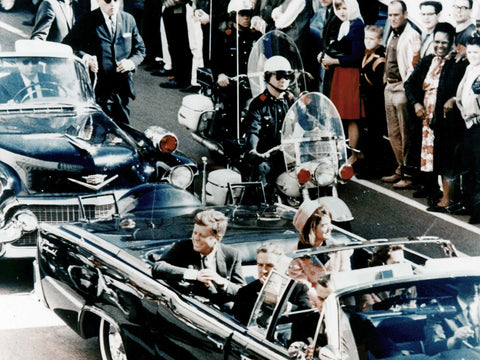
The National Archives Just Released Thousands of JFK Files. Here’s What to Expect.
We have nothing to hide.
That’s the basis for the Biden administration’s decree Thursday for the National Archives to release a cache of 13,173 documents related to the assassination of President John F. Kennedy, a watershed moment in American history.
Recommended for you
On Nov. 22, 1963, Lee Harvey Oswald fired three shots from the Texas School Book Depository, killing Kennedy and wounding Gov. John B. Connally Jr. of Texas as they rode in an open-topped limousine through Dallas.
After over a year of “conducting some 25,000 interviews and running down tens of thousands of investigative leads, the FBI found that [JFK’s killer] Lee Harvey Oswald acted alone. The Warren Commission, which spent nearly a year carefully studying the assassination, agreed,” the FBI website states.
Despite this, persistent conspiracy theories have persisted since that day that Oswald did not act alone.
But “the profound national tragedy of President Kennedy’s assassination continues to resonate in American history and in the memories of so many Americans who were alive on that terrible day,” the White House said in its memorandum. “Meanwhile, the need to protect records concerning the assassination has weakened with the passage of time. …
“It is therefore critical to ensure that the United States Government maximizes transparency by disclosing all information in records concerning the assassination, except when the strongest possible reasons counsel otherwise.”
Established in November 1992, the John F. Kennedy Assassination Records Collection has been publicly available without restrictions on access since the late 1990s, according to the National Archives. The collection consists of approximately five million pages, and, with Biden’s latest push, over 97% of the archive is now available to the public.
Gerald Posner, an investigative journalist and author of “Case Closed: Lee Harvey Oswald and the Assassination of JFK” told The New York Times that anyone believing that the latest batch might change the “fundamental conclusion” reached by the Warren Commission in 1964 was on a “fool’s errand.”
Yet, Posner continued, “the very fact that we are talking 59 years later about what documents the C.I.A. and other agencies are resisting to release in their entirety absolutely feeds the public’s idea that there is something wrong in the Kennedy assassination.”
To date, 28 records in the JFK collection remain “not located,” which have continued to fuel conspiracy theorists.
The most notable files released are the so-called 201 “personality” files the CIA held on Oswald beginning in 1960 — after his failed defection to the Soviet Union in 1959 — and three years before the president’s assassination.
According to the CIA, more than 50,000 pages were compiled on Oswald before and after the slaying of Kennedy, suggesting that the CIA “knew much more about Oswald before JFK’s death — and specifically, the threat he might pose to Kennedy — than the agency wanted to admit,” wrote Politico.
While the latest batch of documents isn’t expected to change the historical record, the sudden access to over 13,000 files is a boon for historians and researchers.
Biden has also said that the National Archives and federal other agencies have until May 2023 to review the remaining unpublished documents. After that, “any information withheld from public discourse that agencies do not recommend for continued postponement” will be released before June 30, 2023.
historynet magazines
Our 9 best-selling history titles feature in-depth storytelling and iconic imagery to engage and inform on the people, the wars, and the events that shaped America and the world.
